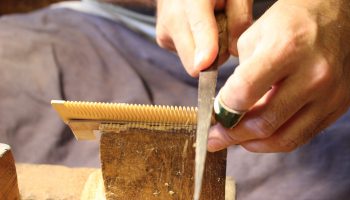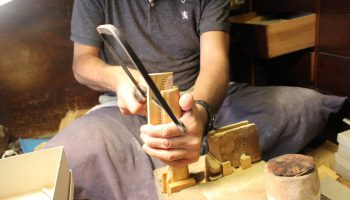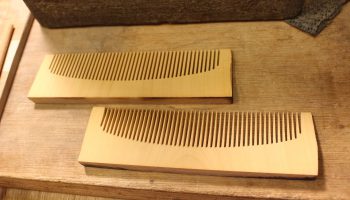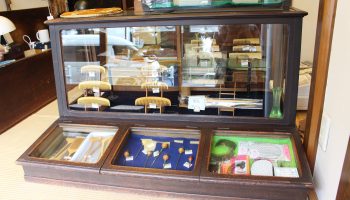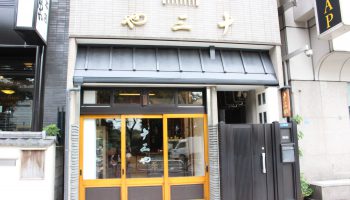Tsuge-kushi [ Boxwood Combs ]
Takeuchi Keiichi
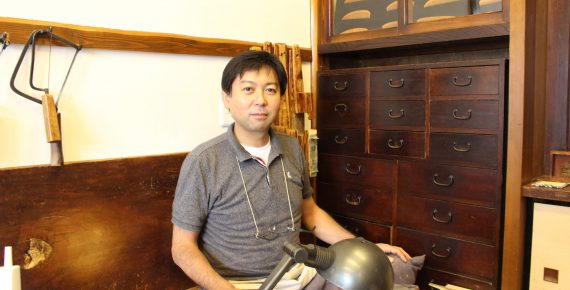
Mr. Keiichi Takeuchi is a comb craftsman, who makes special combs using the wood from a Japanese Box tree. At present, he runs the shop, Jusanya, with his father, the former head of the company.
Jusanya was established in Taito Ward in Tokyo in 1736 during the Edo Period. At that time, the combs were primarily sold to hairdressers who arranged hair for geisha working in the red-light district. Nowadays, however, many customers are placing orders from all over the country after hearing about the popularity of Japanese Boxwood combs.
In the shop, you’ll find many customers, not only Japanese but also many foreign tourists. Europe and Japan both have a history of using wooden combs but because they are rarely sold overseas now many European customers have been coming here to buy them. When Mr. Takeuchi became a craftsman in 1990, his first interview was conducted by a group of reporters from France.
When asked about the reason he decided to become a craftsman, Mr. Takeuchi replied, “My home was also used as a workshop so I sort of thought I would end up becoming a craftsman when I was very young. After that there was a time when I was interested in other things, but after a little persuasion, I started to help out with work when I was a high school student.”
Japanese Boxwood combs have a history as old as the Manyoshu (an 8th century anthology of Japanese poetry), which they were mentioned in. The particular comb mentioned in the poem was dedicated to the gods in the Nara Period (710-794). At the start of the Edo Period (1603-1868), Nihongami (a traditional Japanese hairstyle for women) gained in popularity and the general population started using Japanese Boxwood combs.
Combs can be made out of other types of wood, such as Nashi (Japanese pear tree), Ume (Japanese apricot/plum tree), and Sakura (Japanese cherry tree), but Tsuge (Japanese Boxwood) is the most luxurious as it has an extremely high rarity value.
Japanese Boxwood is very strong and also flexible, making it an incredibly suitable choice for combs. Japanese Boxwood combs will leave your hair shiny, and won’t cause static electricity, hair breakage, or split ends.
Mr. Takeuchi explained that Japanese Boxwood combs come in a variety of sizes and spacing between the teeth to match different hair conditions. “For example, if the customer is elderly and wants to increase their hair’s volume and give it some bounce, we would recommend using a fine comb. In this way, we ask each customer about their hair condition and habits to make the best comb to suit them personally. For this reason it takes about 4-5 months from the time the order is initially placed until the final product is completed.”
One reason that Japanese Boxwood combs are so popular is that they are very durable and can be used throughout your entire life, as long as they don’t get dropped and broken. Also, at Jusanya, they don’t use sandpaper when making the combs. When sandpaper is used it leaves scratches along the teeth of the comb, making them weaker. Instead, they carefully smooth the comb with a file made of sharkskin leather and scouring-rush horsetails. As a result, when you slide the Japanese Boxwood comb through your hair it’ll leave your scalp with a completely different feeling than a normal comb.
In addition, Mr. Takeuchi, who says there are about 60 difference processes involved in Japanese Boxwood comb production, believes that each process is important.
“Once you see the finished product you’ll understand the quality of a craftsman. Because of that there’s a rule at Jusanya where if the quality of the craftsman isn’t good enough they can’t inherit the shop. From now on, I intend to protect the tradition of Jusanya and produce combs that will last a lifetime.” Mr. Takeuchi said about his future ambitions.
Jusanya
Address: (Tokyo) Taito, Ueno 2-12-21
Telephone: 03-3831-3238
